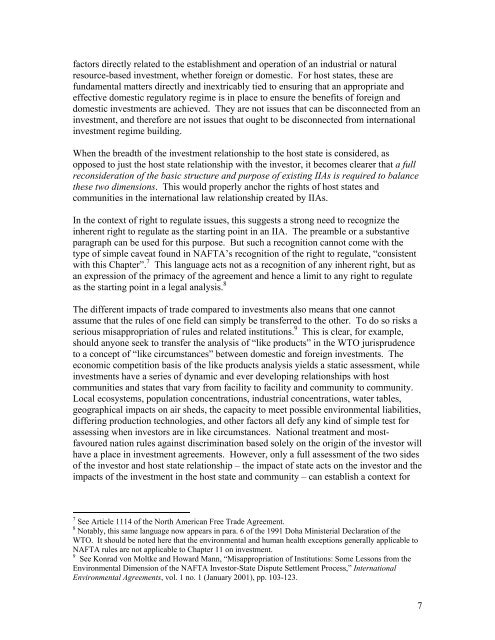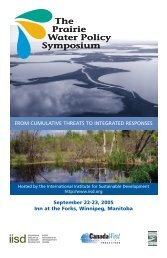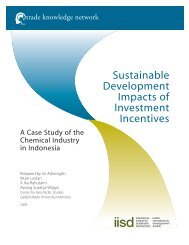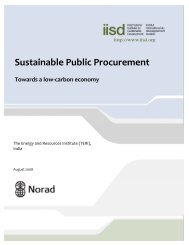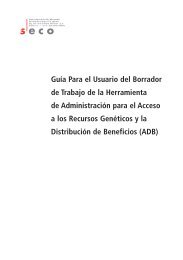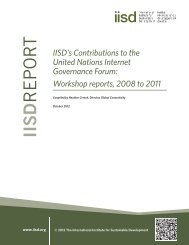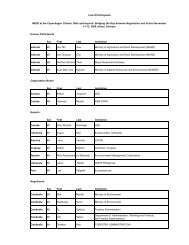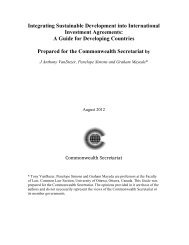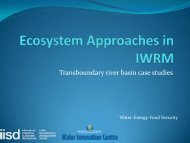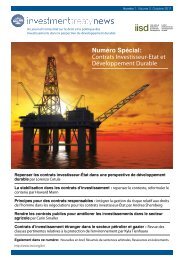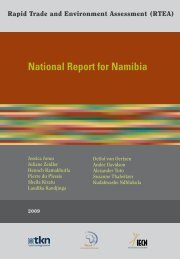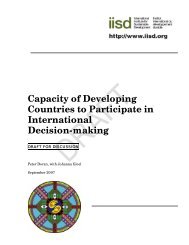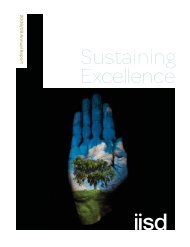The Right of States to Regulate and International Investment Law
The Right of States to Regulate and International Investment Law
The Right of States to Regulate and International Investment Law
Create successful ePaper yourself
Turn your PDF publications into a flip-book with our unique Google optimized e-Paper software.
fac<strong>to</strong>rs directly related <strong>to</strong> the establishment <strong>and</strong> operation <strong>of</strong> an industrial or natural<br />
resource-based investment, whether foreign or domestic. For host states, these are<br />
fundamental matters directly <strong>and</strong> inextricably tied <strong>to</strong> ensuring that an appropriate <strong>and</strong><br />
effective domestic regula<strong>to</strong>ry regime is in place <strong>to</strong> ensure the benefits <strong>of</strong> foreign <strong>and</strong><br />
domestic investments are achieved. <strong>The</strong>y are not issues that can be disconnected from an<br />
investment, <strong>and</strong> therefore are not issues that ought <strong>to</strong> be disconnected from international<br />
investment regime building.<br />
When the breadth <strong>of</strong> the investment relationship <strong>to</strong> the host state is considered, as<br />
opposed <strong>to</strong> just the host state relationship with the inves<strong>to</strong>r, it becomes clearer that a full<br />
reconsideration <strong>of</strong> the basic structure <strong>and</strong> purpose <strong>of</strong> existing IIAs is required <strong>to</strong> balance<br />
these two dimensions. This would properly anchor the rights <strong>of</strong> host states <strong>and</strong><br />
communities in the international law relationship created by IIAs.<br />
In the context <strong>of</strong> right <strong>to</strong> regulate issues, this suggests a strong need <strong>to</strong> recognize the<br />
inherent right <strong>to</strong> regulate as the starting point in an IIA. <strong>The</strong> preamble or a substantive<br />
paragraph can be used for this purpose. But such a recognition cannot come with the<br />
type <strong>of</strong> simple caveat found in NAFTA’s recognition <strong>of</strong> the right <strong>to</strong> regulate, “consistent<br />
with this Chapter”. 7 This language acts not as a recognition <strong>of</strong> any inherent right, but as<br />
an expression <strong>of</strong> the primacy <strong>of</strong> the agreement <strong>and</strong> hence a limit <strong>to</strong> any right <strong>to</strong> regulate<br />
as the starting point in a legal analysis. 8<br />
<strong>The</strong> different impacts <strong>of</strong> trade compared <strong>to</strong> investments also means that one cannot<br />
assume that the rules <strong>of</strong> one field can simply be transferred <strong>to</strong> the other. To do so risks a<br />
serious misappropriation <strong>of</strong> rules <strong>and</strong> related institutions. 9 This is clear, for example,<br />
should anyone seek <strong>to</strong> transfer the analysis <strong>of</strong> “like products” in the WTO jurisprudence<br />
<strong>to</strong> a concept <strong>of</strong> “like circumstances” between domestic <strong>and</strong> foreign investments. <strong>The</strong><br />
economic competition basis <strong>of</strong> the like products analysis yields a static assessment, while<br />
investments have a series <strong>of</strong> dynamic <strong>and</strong> ever developing relationships with host<br />
communities <strong>and</strong> states that vary from facility <strong>to</strong> facility <strong>and</strong> community <strong>to</strong> community.<br />
Local ecosystems, population concentrations, industrial concentrations, water tables,<br />
geographical impacts on air sheds, the capacity <strong>to</strong> meet possible environmental liabilities,<br />
differing production technologies, <strong>and</strong> other fac<strong>to</strong>rs all defy any kind <strong>of</strong> simple test for<br />
assessing when inves<strong>to</strong>rs are in like circumstances. National treatment <strong>and</strong> mostfavoured<br />
nation rules against discrimination based solely on the origin <strong>of</strong> the inves<strong>to</strong>r will<br />
have a place in investment agreements. However, only a full assessment <strong>of</strong> the two sides<br />
<strong>of</strong> the inves<strong>to</strong>r <strong>and</strong> host state relationship – the impact <strong>of</strong> state acts on the inves<strong>to</strong>r <strong>and</strong> the<br />
impacts <strong>of</strong> the investment in the host state <strong>and</strong> community – can establish a context for<br />
7 See Article 1114 <strong>of</strong> the North American Free Trade Agreement.<br />
8 Notably, this same language now appears in para. 6 <strong>of</strong> the 1991 Doha Ministerial Declaration <strong>of</strong> the<br />
WTO. It should be noted here that the environmental <strong>and</strong> human health exceptions generally applicable <strong>to</strong><br />
NAFTA rules are not applicable <strong>to</strong> Chapter 11 on investment.<br />
9 See Konrad von Moltke <strong>and</strong> Howard Mann, “Misappropriation <strong>of</strong> Institutions: Some Lessons from the<br />
Environmental Dimension <strong>of</strong> the NAFTA Inves<strong>to</strong>r-State Dispute Settlement Process,” <strong>International</strong><br />
Environmental Agreements, vol. 1 no. 1 (January 2001), pp. 103-123.<br />
7


